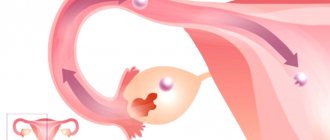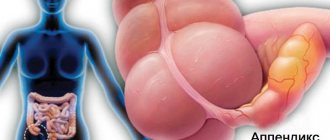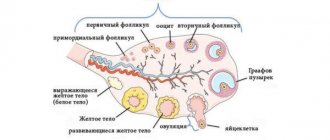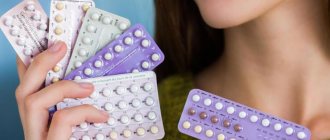What is ovulation? How and on what days does this happen?
A woman's menstrual cycle lasts from 28 to 32 days. Sometimes deviations from the norm occur. Then the cycle can be longer or shorter, from 21 to 35 days. The beginning is considered the day the menstruation begins. Ovulation is the release of a mature egg from the ovary, which is ready for fertilization.
With a 28-day cycle, the egg is released on the fourteenth day from the last menstruation, that is, in the middle of the cycle. With a shorter or longer cycle, ovulation occurs on the twelfth to sixteenth day. After this, if pregnancy does not occur, the unfertilized cell dies within 24 hours. After fourteen days, menstruation begins. The lifespan of a mature cell is very short, only from twelve to 48 hours. This is the time when the female body is most ready to conceive. Is it possible to get pregnant before ovulation? What do experts say about this? We'll talk about this further.
Expert opinion on which days of the cycle pregnancy can occur
The 28/14 day rule is textbook and is suitable for those women who have a regular cycle corresponding to this norm. Since its duration can be different, and sometimes not regular, the day of ovulation can be mathematically calculated incorrectly. In addition, the life expectancy of the egg and sperm should be taken into account. Unlike a cell, the sperm of a healthy man, once in the uterus and tubes, remain active for almost a week. In some cases longer. Therefore, it is believed that pregnancy can occur within 5-6 days in the middle of the menstrual cycle.
However, various women's myths that it is impossible to get pregnant immediately after menstruation or a few days before the start are not justified in practice. When using the calendar method to determine “dangerous” days, do not forget that the cycle can change under the influence of many factors. Normal nervous tension, stress, climatic conditions, and hormonal imbalances can cause changes in duration. Then ovulation will occur earlier or later. Plus the lifespan of a sperm in a woman's body. It is quite long, and this also makes pregnancy possible not on the days of ovulation. There is no clear answer to the question of whether it is possible to get pregnant before ovulation. But practice shows that this happens quite often.
Libido peaks during ovulation
At the University of Virginia, Charlottesville, researchers used standardized surveys to measure libido and sexual function in 115 women ages 23 to 45. Each participant took it twice: in the middle of the cycle and before menstruation. They emphasized that they experienced greater interest in sex and better orgasms in the middle of the cycle.
Dutch researchers showed erotic videos to 20 women whose genitals were connected to a special machine to control blood flow. Increased circulation indicates increased arousal. Blood flow increased more in those women who were ovulating. In the accompanying survey, women also admitted that they felt the most horny at this time of the month.
Researchers from the University of Rhode Island conducted a study with 96 women. They were asked to rate their own interest in one of four types of films. Among them were: comedies, melodramas, action films and erotica. Researchers have documented a "surge" in interest in erotic films as women approach ovulation.
Other researchers from Arizona State asked 236 women to conduct personal observations of their bodies, tracking the frequency of masturbation and basal body temperature. The temperature rises sharply during ovulation, and the peak of masturbation occurred precisely at the time when the temperature rose.
Researchers from Canada filmed nineteen women walking down the street. At the same time, some were menstruating, while others were ovulating. Thirty-five men watched the videos and rated each of them as sexually attractive. When comparing women to each other, those who were ovulating swayed their hips more. It's easy to guess who the stronger sex preferred.
Is it possible to get pregnant on days other than ovulation?
It is generally accepted that it is impossible to get pregnant on days when ovulation does not occur. How does it really happen? There are cases where women became pregnant on days when conception was considered impossible. The menstrual cycle is divided into three phases. The first phase is the days of menstruation. Lasts up to three, in some cases up to seven days. The second phase is favorable days for conception. Depending on the length of the cycle, it can range from five to ten days. The third phase is safe days, from seven to twelve days, in which, as is generally believed, pregnancy cannot occur. But women with short cycles should not rely on this. Sexual intercourse that occurs two to three days before your period can cause pregnancy.
Representatives of the fair sex believe that it is impossible to conceive a child during menstruation. Yes, in the first days of menstruation, due to the large amount of discharge, the chances are zero. Since the environment for sperm is extremely unfavorable. In the last days of menstruation, this possibility cannot be excluded. You should be especially careful in this matter if you have a long or irregular cycle. When the volume of secretions decreases, sperm viability increases. Then the likelihood of getting pregnant during menstruation increases.
Peculiarities
Is it possible to get pregnant not on the days of ovulation, but, for example, a few days before the onset of menstruation?
The possibility of pregnancy cannot be ruled out. Previously, it was believed that a woman produces one egg per cycle. Recent studies have shown that girls may re-ovulate. The second cell comes out a day or two to three days after the first. The longest gap between the first and the second can be one week. Therefore, you should not exclude the possibility of becoming pregnant in the days before ovulation.
Causes
Girls, who are physiologically unusual for such a frequent desire for intimate contacts as men, are interested in why they want intimacy during ovulation. It’s worth saying right away that the true reason lies in the hormonal changes in the body, but besides this, one should not exclude the possibility that the instinct of procreation is triggered.
After the egg matures and is released, women want sex more. Source: scmp.com
Sometimes girls don't feel like having sex during ovulation. There is also a normal explanation for this, and it is also related to hormones. During this period, the body experiences an increase in the level of some substances and a decrease in the concentration of others, but if a woman has recently suffered a strong emotional shock, then she may not have the desire to engage in intimate intimacy.
The majority of gynecologists are sure that during ovulation you want intimate intimacy if a woman is already ready for procreation and wants to have children. Hormones also play an important role here, given that the synthesis of these substances is partly controlled by the brain and nervous system; on certain days of the cycle, a signal is triggered that the very moment has come when fertilization of a mature egg can be carried out.
It is worth noting that a woman feels a similar desire several days before the onset of menstrual bleeding. It is possible that girls do not want to have intimacy on the expected day of ovulation for the reason that it was determined incorrectly.
A week
Is it possible to get pregnant a week before ovulation? With a cycle of 28 days, ovulation occurs on the 14th day, respectively, with a cycle of 32 this will occur on the sixteenth day of the cycle. A female cell lives for a maximum of 24 hours. Sperm in the vagina remain active for up to seven days. That is, if sexual intercourse occurs a week before ovulation, then especially tenacious sperm can wait for the cell to mature and exit, and, therefore, fertilize it.
The question about dangerous days is asked by women and girls who are sexually active without contraception and who do not want to get pregnant. You can calculate the days on which the next ovulation will occur if:
- the menstrual cycle is regular;
- lasts the same number of days each time;
- there are no diseases.
One should not discount the fact that the female body is very sensitive; a cycle failure and a shift in the date of ovulation can occur at any time. Some experts believe that it is impossible to accurately calculate even in healthy girls of childbearing age with regular periods.
In 4 days
Is it possible to get pregnant 4 days before ovulation? This period is considered the most favorable for conception, for those who want a child. For those who do not plan to become parents, these days you should be extremely careful. Using contraceptives is the best way to protect yourself.
Even more interesting:
What is Unidox prescribed for?
Ulcers due to thrush in women
Doctors' opinion
Is it possible to get pregnant before ovulation? With a 28-day cycle, ovulation occurs on the fourteenth day. Taking into account the lifespan of cells and sperm in the female body, pregnancy is considered possible before ovulation. More precisely, sexual intercourse committed before this moment will cause pregnancy; sperm will fertilize the cell immediately after its maturation. On the contrary, sex after ovulation rarely leads to pregnancy. Since the lifespan of a cell is quite short. It was found that an egg ready for fertilization lives for a maximum of two days. Afterwards she loses her ability. Then it is eliminated from the body with the onset of menstruation. Sexual intercourse on the days of ovulation is the best chance for a woman who wants to get pregnant. This period ranges from four to ten days per month, depending on the length of the cycle.
Doctors have found that women have menstruation once or twice a year without ovulation. That is, without cell maturation. In this case, pregnancy is impossible. This is not a deviation from the norm. This process is considered normal.
Accordingly, with a cycle of 30-26 days, ovulation will occur on the fifteenth to thirteenth, respectively. By counting six to seven days from this date, you can find out the maximum date of sexual intercourse before ovulation, which can lead to pregnancy. During this time, the egg will mature and be fertilized.
What prevents pregnancy
If there is no desire to be pregnant, then sex must be with a condom, since other methods cannot 100% protect a woman from unplanned conception. Sex after ovulation, performed 3-4 days later, will also affect the situation. At this time, the life of the egg will end and even if sperm accidentally enters, fertilization will not occur.
And if you plan to conceive a baby, you should know that pregnancy does not always occur on the day of ovulation. There are various reasons for this:
- sperm quality, affecting their motility and vitality;
- pathologies or abnormalities of the uterus that interfere with the advancement of sperm;
- hormonal imbalance, as a result of which the ovulatory process is disrupted;
- immunological incompatibility of partners, when the female body kills sperm;
- inflammatory processes in the female body, disrupting hormonal levels and leading to early release of the egg;
- spontaneous termination of pregnancy because the embryo cannot implant into the wall of the uterus (that is, fertilization occurs, but there is no pregnancy).
Factors that influence. Pay attention to them
The female body does not always work “on schedule”. The reproductive system is a very sensitive mechanism that has not yet been fully studied by medicine. It is exposed to external and internal factors:
- climate change;
- heavy physical activity and hard work;
- stress;
- infectious diseases;
- hormonal imbalance in the body;
- hypothermia or overheating;
- taking medications;
- overweight or underweight.
Why do you want sex more during ovulation?
A woman's sexual desire is regulated by sex hormones. This explains why you want sex during ovulation. Each phase of the cycle is dominated by certain groups of hormones. Estrogens are responsible for the processes occurring in the follicular phase of the cycle. They begin to actively increase immediately after the end of menstruation. Estrogens promote the enlargement of follicles within which eggs mature. At the same time, hormones stimulate the growth of the endometrium.
For ovulation to occur, LH levels must rise.
The surge of the hormone provokes rupture of the ovarian wall. As a result, the egg is released and sent to meet the sperm. During this period, the woman notices a pronounced increase in sexual desire. Vaginal discharge becomes more abundant. They are a favorable environment for the advancement of sperm.
All processes occurring during the maturation and release of the egg are aimed at successful conception. For most women, under the influence of hormones, their performance increases and their mood improves.
Why do you want intimacy during ovulation?
Ovulation is the process of releasing an egg ripe for fertilization from a follicle located in the ovary. Preparation for this period takes 12–14 days, and sometimes longer, but the process itself is short and takes only 1 day. It is on this day that a woman can feel a strong sexual desire, suggesting that the most favorable time for conception has come.
This desire in women occurs thanks to hormones that constantly dictate their rhythm of life. It is this rhythm that women constantly have to put up with and adapt to.
Nature has decreed that sex during ovulation is the best way to get pregnant. If a young couple plans to have children, they should have sex 1–3 days before and immediately during this period. And if there is a need to avoid pregnancy, then a week before and during the ovulatory process you should avoid sexual intercourse.
The best days to conceive a child
A woman's fertility directly depends on the day of her menstrual cycle. To determine the period of increased reproductive function, not only the life expectancy of the egg is taken into account, but also the spermogram indicators. On average, sperm can exist in the female body for 2-5 days. In some cases, they live for 7 days or die a few hours after entering the uterus. Sex before ovulation often leads to pregnancy. That is why the calendar method of calculating fertile days is not reliable enough. Favorable days for conceiving a child include:
- 3-5 days before the release of the egg;
- day of egg release;
- 2 days after.
Spermogram
Sex 5 days before ovulation
Having sex five days before ovulation with completed intercourse gives about a 10% chance of conception. For those who want to avoid conception, it is better to start abstaining from sex without contraception. But for those who want to have a child, it’s time to start active sexual intercourse.
Sex 2 days before ovulation
Unprotected intercourse 2 days before ovulation guarantees you approximately 27% success of conception. In order to reduce the chances to zero, you need to protect yourself or completely exclude the possibility of sexual contact with your partner.
Kiss
Sex the day before ovulation
The best moment for conception is considered to be 1 day before ovulation. The probability of conception at this moment increases from 30 to 33%. Having sexual intercourse the day before the egg is released gives the sperm enough time to mature and reach the egg in time. Interrupted sexual intercourse without contraception increases the chance of conception.
Sexual intercourse on the day of ovulation
If a couple had unprotected sex during ovulation, the probability of pregnancy does not exceed 31%. In this case, both partners must be completely healthy. In the presence of pathologies, the chances of fertilization are significantly reduced. Therefore, a diagnosis of infertility is made only if conception does not occur with regular sex within a year.
Infertility
It is advisable to have sex after ovulation no later than 48 hours after the follicle ruptures. In other cases, the chances of fertilization are zero. The egg has a short lifespan. If she does not have time to collide with the sperm, she dies. It leaves a woman's body during menstruation. In some cases
Is it possible to increase the chances of conceiving?
This question is very relevant for couples who dream of an heir or heiress. And if you didn’t succeed in conceiving a baby the first time, despite intercourse during the ovulation period, you shouldn’t despair - only 17% of couples get pregnant the first time, the rest just need more time. There are a great many reasons why fertilization does not occur even when germ cells meet, and not all of them have been studied by medical science.
It is known that the vast majority of planning couples manage to get pregnant within six months to a year. If you are over 35 years old, then after six months of unsuccessful attempts you should seek medical help. Often, a couple needs to undergo mutual examination - tests for infections, hormones (for example, if prolactin is elevated in a woman’s blood, ovulation does not occur). And in 85–90% of cases, doctors will be able to help by prescribing conservative treatment to bring the partners’ hormonal levels back to normal.
It is better for those planning to start having sexual intercourse with the onset of the fertile window (3-4 days before ovulation). You should not make love too often - multiple ejaculations reduce the quality of seminal fluid. But long-term abstinence also reduces the quality of sperm, and therefore it is worth sticking to the so-called golden mean - sex every other day.
With such a rhythm of sexual life, men have an optimal spermogram for conception.
Almost all ovulation disorders in women are associated with changes in hormonal levels, deviations from the norm in the amount of certain hormones in different phases of the cycle. To improve women's health, you need to carefully monitor your cycle and consult a doctor in time if a malfunction occurs.
Simple recommendations will help increase your chances of conceiving.
- Avoid hard work, exhausting physical activity, and working at night - many hormones are produced in the required quantities only during night sleep, and therefore for women and men who are planning to conceive, a good night's sleep is crucial.
- You should give up alcohol, nicotine, and drugs. For men, it is important to stop using marijuana while planning (many consider it harmless, but in practice it has been proven that cannabinoids cause changes in the morphological characteristics of sperm). It is important for a woman to give up coffee, strong tea, and even dark chocolate (anything that contains a large amount of caffeine interferes with female fertility).
- When performing sexual intercourse, you should not use lubricants and intimate gels. And after sexual intercourse, you should not immediately run to the bath or shower; it is better to lie still, with your legs elevated: sperm take about 40 minutes to reach the fallopian tubes. Do not douche after sexual intercourse.
You should not place high hopes on decoctions, herbs and vitamins. They are rather akin to the placebo effect; the impact of traditional medicine on the level of fertility of sexual partners has not been proven. Take vitamins only with your doctor's permission to prevent an overdose of certain substances. A healthy couple does not need folk remedies; within a year they will be able to conceive a child without sage or hogweed. And for couples with reproductive disorders, folk remedies are unlikely to help - more often they need complex treatment, which includes hormonal agents.
Before conception, 3 months before conception, a man needs to stop visiting bathhouses and saunas, since heating the scrotum several times reduces the number of mobile and viable sperm. Both partners are recommended to wear comfortable underwear made from natural fabrics that does not rub, does not pinch, or interferes with the blood supply to the small pelvis.
Nutrition must be complete, it must contain proteins - meat, fish, poultry. If a woman is a big fan of mono-diets for weight loss, she should abandon such diets while planning conception.
Particular attention should be paid to weight - with obesity and an increased body mass index, the likelihood of conception is reduced, and losing just 5% of body weight often allows you to fully resolve the issue of family infertility without any treatment at all.
The psychological state of the partners is also important. A man who is constantly under stress usually cannot boast of excellent spermogram results, and women with chronic emotional and psychological stress often develop anovulation - lack of ovulation, which becomes the cause of female infertility.
Why is this happening? Because stress hormones - adrenaline, cortisone - partially inhibit the synthesis of sex hormones, which are very important for the normal process of sperm formation (spermatogenesis) and for ovulatory processes. Thus, stress is a common cause of hormonal imbalance in the body of men and women.
This is especially noticeable in the example of women. The more a woman wants to become a mother, the more stress she experiences each menstrual cycle.
Conception does not work out, and when the couple, having already come to terms with the futility of attempts, abandons the idea of conceiving a child, pregnancy after some time occurs suddenly and unexpectedly for everyone. The woman simply calmed down and her hormonal levels returned to normal.
The likelihood of pregnancy during the period of ovulation is reduced even if the cycle included travel with changes in climate and time zones. In such situations, a woman’s internal biological clock gets confused, ovulation may occur earlier or later than expected, or may not occur at all.
has a negative impact on the fertility of partners . It is not advisable for women to take painkillers during the period of ovulation; they negatively affect the condition of the reproductive cell. You should stop taking medications with your doctor’s permission in advance - 2-3 months before conception, this is especially important for men , because the process of sperm renewal takes at least 90 days.
A couple determined to have a child should not forget about feelings. Without them, sex turns into a series of body movements, and the likelihood of conception decreases. It has been proven that in couples where love reigns, it is possible to conceive a baby much faster than in couples where they have sex “on duty”.
medical reviewer, psychosomatics specialist, mother of 4 children
Also read: Large boil on the face
Unprotected intercourse (unprotected intercourse) during ovulation is one of the most unreliable means of contraception. Interruption of sexual intercourse is associated with certain risks. In some cases, such an act can cause pregnancy. But you should not regard PA as a 100% guarantee of conception.
How to increase your chances of conceiving?
Doctors recommend that all couples planning a pregnancy practice sex during ovulation. But this does not always lead to the desired result the first time. According to statistics, only 30% of cases of unprotected sex result in pregnancy. There are factors that can affect the fertility of partners. To increase the chances of successful fertilization, you must resort to the following manipulations:
- The correct development and timing of egg release is confirmed using ultrasound folliculometry. The procedure will help identify a woman’s fertile period.
- Taking a spermogram will allow you to estimate how many days of abstinence a particular man needs before sexual intercourse.
- The position during sex is determined by the individual structure of the woman’s genital organs. For example, when the uterus is bent, a woman is recommended to be in a knee-elbow position.
- Vitamin supplements will help improve the quality of seminal fluid and stimulate ovulation in a woman.
- A man should avoid taking hot baths and visiting the sauna. High temperatures reduce sperm viability.
- In preparation for pregnancy, both partners should avoid drinking alcohol, caffeine and smoking.
- You should not practice sexual intercourse too often or too rarely. The optimal interval is 2-3 days. If there are deviations in the spermogram, it is determined individually.
- It is advisable to exclude stressful situations, since the psychological factor can have a depressing effect on reproduction.
Unprotected intercourse during ovulation
Unprotected intercourse on the day of ovulation does not provide 100% confidence that the egg will be fertilized. If a man has insufficiently motile sperm, the chance of pregnancy is reduced. The following factors are also important:
- Patency and contractility of the fallopian tubes;
- Endometrial thickness;
- Consistency and Ph-environment of vaginal secretion;
- Age of partners;
- Presence of infectious diseases.
If there was an unprotected period during ovulation, after 10-14 days an hCG test will help to understand whether conception has occurred.
Coitus interruptus
The question of whether it is possible to have interrupted sex during ovulation is most often of interest to young people. Not everyone knows that this method does not protect against pregnancy. It cannot be used as contraception. Active sperm are contained not only in the seminal fluid, but also in the lubricant that is released during sexual intercourse. If barrier protection is not used, sperm will enter the uterus before ejaculation. Therefore, as a result of interrupted sexual intercourse, conception can occur.
What is the probability of conception
All women who have problems conceiving are advised to determine the ovulation date and have sex repeatedly on this day. However, even if ovulation is accurately determined, pregnancy may not occur.
According to medical statistics, only 25% of women manage to get pregnant on “that very” day. This is due to the fact that if there are problems with the reproductive system, even ovulation may not affect the likelihood of fertilization.
The likelihood of conception often decreases not only due to problems in the female body, but also due to pathologies in the partner. Lack of pregnancy after sexual intercourse may be a consequence of abnormalities in the functioning of sperm.
In this video you will find the main signs of ovulation:
If you cannot get pregnant within several months, it is recommended to consult a specialist who will recommend treatment.
How to increase the chances of successful fertilization
Proper planning for conceiving a child involves preparing future parents for at least six months. You can increase the likelihood of fertilization during ovulation by first undergoing diagnostics of the body of both partners and eliminating existing pathologies.
You can additionally increase the chances of successful fertilization by the following methods:
- the frequency of sex during ovulation should be at least three sexual acts, but before this day you should abstain from sex for about a week;
- For 2 – 4 weeks it is recommended to give up alcohol, cigarettes and caffeine, eat right and take vitamins;
- you must try to avoid stressful situations and excessive physical activity;
- You should have sex in different positions, giving preference to positions where women’s knees are pressed to the chest.
According to the advice of medical experts, you need to have sex on the day of ovulation without the use of stimulants and various lubricants.
What can interfere with pregnancy
When looking for reasons that prevent conception, in addition to diseases, you should pay attention to negative factors that affect the reproductive function of partners.
Problems with conception may be due to depression
Possible reasons for lack of pregnancy:
- the age of one of the partners (or both) is more than 40 years;
- previous abortion;
- frequent stress, depression;
- overweight;
- bad habits;
- not healthy eating.
Ovulation lasts only one day and it is not always possible to get pregnant at this moment. Experts advise not to limit yourself to hoping only for this period; if the couple’s plans are to become parents, then they need to have sex after ovulation, adhering to all the recommendations for successful conception.
How to avoid pregnancy?
To prevent the development of pregnancy, it is necessary to avoid unprotected sex after ovulation, during it and a few days before it begins. It is necessary to use the most effective means of contraception during this period. These include:
- Intrauterine device;
- Condom;
- Oral contraceptives (Dosage form of contraception, in other words, a tablet).
ATTENTION! Before taking birth control pills, ALWAYS consult your doctor! An article about the consequences of taking postinor.
It is not recommended to practice interrupted coitus on the day of ovulation. It does not provide the required level of protection. The calendar method of birth control is suitable only for women with a regular menstrual cycle. Favorable days for conceiving a child fall exactly in the middle of the cycle. The rest of the time, the likelihood of conceiving a child decreases. The exception is situations in which ovulation is delayed by several days. This occurs due to hormonal imbalances or under the influence of stressful situations.
Women who are planning to conceive a baby or, conversely, are puzzled by the issues of preventing untimely pregnancy, often ask questions about the likelihood of pregnancy on different days of the menstrual cycle. Is it possible to get pregnant 3 days before ovulation? This is one of the most frequently asked questions.
Hunger during the ovulation period
The percentage of progesterone does not decrease, so the fat does not disappear anywhere. After the 15th day of the cycle, it is very difficult to adhere to a diet, since due to changes in hormonal levels, appetite doubles in the second phase of menstruation.
Women during this period become very active and not too irritable. Increased hunger may be associated specifically with mobility and energy expenditure. Create a balanced diet for yourself, include buckwheat, apples, pomegranate, liver and beef.
When is conception possible?
Misunderstandings and questions usually arise due to the fact that there are some difficulties with the formulations regarding the likelihood of conception. From the point of view of medicine and science, conception is possible only when there is a mature egg cell ready for fusion. And conception itself (the fusion of gametes and the exchange of DNA information) occurs only during the ovulatory period, which includes the day of ovulation itself and the day after it. The fact is that the egg lives no more than 24-36 hours after it leaves the follicle on the surface of the ovary, and only during these hours is it possible for it to merge with the sperm.
Chances in percentage
Of course, the closer to the day of ovulation, the higher the probability of conception, and from this point of view, the prospect of conceiving a baby during sex 1-2 days before the release of the oocyte is much higher than with sexual intercourse 3-4 days before.
The likelihood that partners will become parents increases if they are young and healthy. After all, with age, the quality of reproductive cells decreases in both men and women.
In women, the frequency of anovulatory cycles, in which ovulation does not occur at all, increases with age, and therefore the likelihood that after 35 years of age a woman will become pregnant the first time during coitus three days before ovulation is significantly lower than the chances of a 25-year-old woman in similar circumstances .
According to reproductive specialists, the maximum chance of becoming pregnant exists in young and healthy women if they have contact on the day of ovulation. It is estimated at 33-34%. If unprotected intercourse took place 3 days before ovulation, then the probability can be estimated at approximately 16%. If a woman has crossed the age limit of 35 years, then the probability is no higher than 7%, and for women over 40 years old - no more than 1%. The age of the man also plays a role. The younger and healthier a man, the higher the likelihood that his sperm will be able to “last” in the female genital tract for 3-4 days.
You can get pregnant not only with direct ejaculation into the genital tract, but also with interrupted sexual intercourse. Since male reproductive cells suitable for fertilization can be contained in certain quantities in the precoital physiological lubricant, which is produced in men at the time of sexual arousal. Sperm entering a woman's external genitalia can also cause pregnancy, but at the same time fewer germ cells enter the genital tract, and the chances that they will survive to ovulation are rapidly decreasing.
Chances of pregnancy
A prerequisite for pregnancy is the meeting of two full-fledged, viable germ cells: male and female. Therefore, any sex during the period of release of the oocyte, if sexual intercourse is unprotected, or there is at least a minimal probability of sperm penetration into the woman’s genital tract, can theoretically lead to pregnancy.
It is important to understand that sexual intercourse that occurs a few days before the release of the egg can cause pregnancy. Sperm have greater vitality than the female reproductive cell, and they can exist in the female genital tract for up to 3–5 days without compromising their abilities.
If you had unprotected sexual intercourse 3-5 days before ovulation, then the probability of conception is also high - the sperm will wait for the egg and immediately begin fertilization, while there may be no sex at all directly on the day of ovulation.
Reproductologists estimate the chance of conceiving the first time with unprotected intercourse on the day of ovulation and within 24 hours after it (while the oocyte lives) at a maximum of 33–34%. This means that every third couple can conceive a child during this period. When having sex before ovulation one day, the chances of getting pregnant are estimated at 29–30%, two days before the release of the oocyte - 26-27%, three days before - 16%, four days - 10%.
In many ways, the probability depends on a wide variety of factors and may be lower under certain conditions. It is influenced by:
- age of partners;
- their health status;
- the presence or absence of bad habits.
The above percentage chances apply to couples who are in the prime of their reproductive period - 20–30 years. After 30 years, the process of aging of germ cells begins, and chronic diseases acquired by a man and a woman affect them. The ovarian reserve of women after 35 years is rapidly depleted; anovulatory cycles (in which ovulation does not occur at all) can occur 5–6 times a year. Spermatozoa also do not get younger over time, mobility is lost, the lifespan of germ cells is shortened, morphological changes appear, and therefore the probability of conception in a 35-year-old couple from the first time on the day of ovulation does not exceed 15%, and after 40 years it is no more than 1– 3%.
You can get pregnant in the ovulatory phase not only from unprotected sexual intercourse with full ejaculation. The probability of pregnancy is also quite high if sexual intercourse is interrupted. And the point is not even in the speed of a man’s reaction, as many believe, but in physiology. In men, full-fledged and mobile germ cells in small quantities can also be part of the physiological lubricant, which is produced quite naturally in a man in a state of sexual arousal.
If a couple has more than one sexual intercourse, then the next lubricant will definitely contain sperm remaining from the first ejaculation. Of course, there will be few of them, but you don’t need a lot for conception - one strong, mobile, healthy sperm is enough.
The younger and healthier the couple, the higher the likelihood of pregnancy. This should not be forgotten either when planning the long-awaited conception, or when addressing issues of contraception. It is necessary to have sex during the period of ovulation to conceive, but for those whose plans do not yet include the birth of offspring, it is worth having sexual intercourse with a condom - barrier contraception has a high Pearl index, which indicates reliability.
Also read: Increased leukocytes in a woman’s urine
Oral contraceptives are even more reliable. The principle of their action is hormonal suppression of ovulation, which means that while taking OCs the egg does not mature and is not released. Only protected sexual intercourse guarantees that there will be no “surprises”. A doctor should select a contraceptive for a particular woman.
Here are a few statistics on which the Pearl index for determining the effectiveness of contraceptives is based:
- with the use of oral contraceptives (OC) - pregnancy occurs in 0.03 -0.5 cases per 100 couples;
- with the use of an intrauterine device, an “interesting position” can occur in 2-3 couples per 100;
- with a condom - 5–10 women out of 100 become pregnant (usually due to mistakes by partners in using a contraceptive);
- with interrupted sexual intercourse, 15–20 out of a hundred women become pregnant.
Studying the features of your menstrual cycle, being able to identify and distinguish ovulation from other days of the cycle is very important not only for those planning to conceive, but also for those who are protecting themselves from unwanted pregnancy.
Useful tips for those planning pregnancy
If it is not possible to have sexual intercourse at another time, then 3 days before ovulation is a completely appropriate moment. Simple tips will help increase your chances of conceiving:
- You should not use lubricants during intercourse;
- after sex, you need to lie quietly for about 40 minutes, throwing your legs higher so that as many male reproductive cells as possible have time to reach the fallopian tubes (usually this journey takes about 40 minutes);
- You should not douche after sexual intercourse.
The best way to increase your chances of conceiving is to have repeated sexual intercourse the day before ovulation, on the day of ovulation and a day later, or at least every other day.
PPA before ovulation
Pregnancy when sperm enters a woman’s vagina is not so rare. But few people know that sperm require a certain time in order to “reach the goal.”
It is advisable to carry out unprotected intercourse several days before the egg matures and enters the fallopian tube.
It takes sperm about 3 days to “reach” the egg and fertilize it. For this reason, doctors recommend calculating the day of ovulation and conducting PA even before its onset. This way there will be more chances of conception.
The possibility of pregnancy cannot be excluded even if PA occurred long before ovulation. It's just that the probability of its occurrence is much lower. Since during this period the cell has not yet matured and the probability of its fertilization is practically zero.
The closer you are to ovulation, the higher your chances of conception. This should not be forgotten by those girls or women who are trying to conceive a child and those who are trying to avoid pregnancy.
Recommendations for contraception
Interrupted sexual intercourse is not a very reliable method of protection, and pregnancy, even if sexual intercourse took place three days before ovulation, may become unexpected and untimely news for partners. During the fertile window, barrier methods of contraception or oral contraceptives, which suppress the ovulation process in principle and make it impossible for the egg to be released, are more promising.
If sexual intercourse with an insufficient degree of protection does occur, then within 24-48 hours you can take a hormonal drug intended for postcoital contraception, for example, Postinor. There are no guarantees that there will be no pregnancy, because even when taken on the first day after intercourse, the effectiveness of the drug is only 90%, and after 72 hours such drugs may be completely ineffective.
Postcoital contraceptives often cause menstrual irregularities and hormonal imbalances, and therefore should not be used on a systematic basis.
medical reviewer, psychosomatics specialist, mother of 4 children
Prevention
If a man and woman are not planning pregnancy and the birth of a child in the near future, then they are recommended to use additional or the most effective methods of contraception on the day the egg is released and the partner’s sexual desire increases.
Barrier contraception. Source: 900igr.net
Health professionals advise these couples to take note of the following:
- A woman is advised to start taking combined oral contraceptives early;
- If COCs have not been used, then it is better to resort to a barrier method of contraception (use a condom);
- When using chemical contraception, the likelihood of fertilization is reduced by 70%.
As for interrupted intercourse, it cannot be considered as a reliable method of preventing unwanted pregnancy at any period of the menstrual cycle, especially if a woman is ovulating, since with a high degree of probability this can lead to pregnancy.
If a couple entered into intimate intimacy and planned to perform PPA, but the ejaculation process could not be controlled, to prevent the fertilization of an egg by a sperm, you can use emergency contraception, for example, drink Postinor. It is better to do this within the first 24 hours, but no later than 3 days after sexual intercourse. The effectiveness level of such medications is 70%.
Even if a woman clearly knows on what day she should ovulate, we cannot exclude the possibility that this period may shift up or down. Maturation of the egg can occur earlier or later under the influence of various factors, including:
- Hormonal imbalance;
- Staying in stressful situations;
- Taking hormones or antibiotics;
- Regular heavy physical activity.
Sexual intercourse itself does not have any effect on the day of ovulation, nor on the process of egg maturation in the ovary. Hormonal medications inhibit the onset of ovulation, since they have a direct effect on the quality of cervical mucus, which, with certain characteristics, reduces the likelihood of pregnancy.
If a woman has been in stressful situations for a long time, or has recently suffered a strong emotional shock, or perhaps is involved in heavy physical labor, then this will definitely affect the condition of her body as a whole. Therefore, it should not be ruled out that there may be a hormonal imbalance, against the background of which there is a disturbance in the stability of the menstrual cycle, and ovulation begins at the wrong time.
It is also necessary to monitor the intake of various medications. So, for example, if a girl was undergoing treatment, and antibiotics or hormones were present in the drug therapy, then she will definitely have problems with the functioning of the reproductive system for some time, which also affects the stability of the menstrual cycle.











